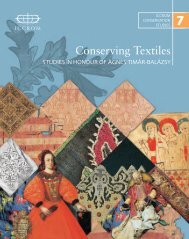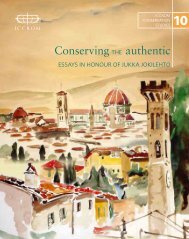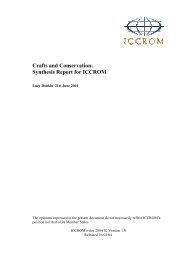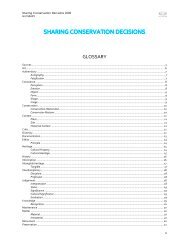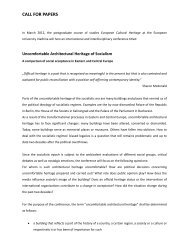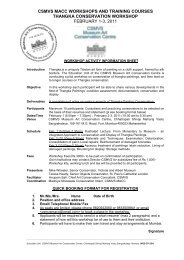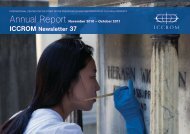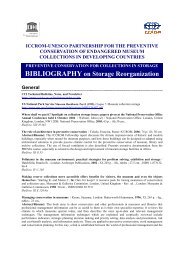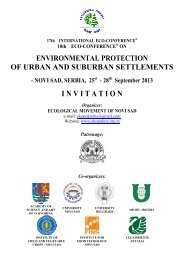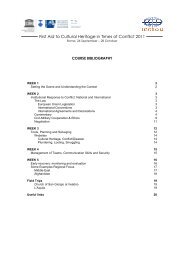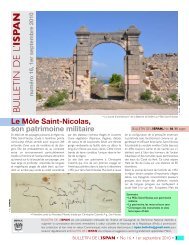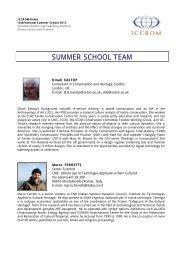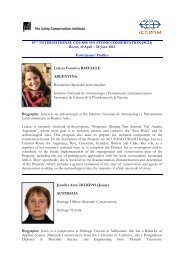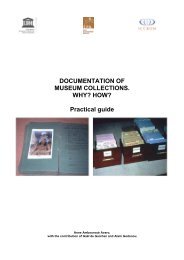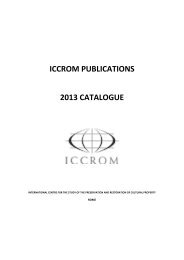part 1 - Iccrom
part 1 - Iccrom
part 1 - Iccrom
Create successful ePaper yourself
Turn your PDF publications into a flip-book with our unique Google optimized e-Paper software.
How to register memory? Documentation, recording, archiving and<br />
preservation of intangible cultural heritage in Venezuela<br />
Jenny González Muñoz 1<br />
Abstract<br />
Culture as a social construction of human beings and nature produces intangible manifestations sustained<br />
primarily by the oral tradition, which gives it significant features that print decisive elements for the creation<br />
of technical documentation, recording, archiving and preservation of intangible cultural heritage. In Venezuela,<br />
the problems in carrying out this task have remained; failures related to the true meaning ascribed to<br />
intangible cultural expressions considered from the perspective of libraries for attributing items of material<br />
culture. The best documentation, in-depth research product is essential not only for the preservation and<br />
revitalization of intangible cultural heritage but for the formation of consciences on the basis of respect and<br />
appreciation for the sake of intercultural dialogue.<br />
Keywords: intangible cultural heritage, documentation, records, files, preservation, Venezuela<br />
1<br />
Ministerio del Poder Popular para la Cultura – Centro de la Diversidad Cultural (Venezuela). jenny.planificacion@gmail.com<br />
Introduction<br />
The status of cultural processes is implied in its<br />
expression, a neat and unique human being, who<br />
takes hold of their interpersonal relationships to<br />
meet and conduct their own collective life projects.<br />
This, guided by necessity, creates a series of utilitarian<br />
items, but also carries away an ability to improve<br />
themselves, their environment, context and community.<br />
Culture leads man to worship gods, clinging to<br />
the existence of higher beings to justify their stay in<br />
the world and respond to uncertainties and doubts;<br />
this creates myths, rites, ceremonies and legends.<br />
The functions of aesthetics, customs, traditions and<br />
preferences in establishing different types or aspects<br />
of culture that change as situations occur, imply a<br />
dynamic power that is manifested in the daily treatment<br />
and non-daily life according to the weather<br />
conditions and space.<br />
Culture is a constant imperative for each and every<br />
one of the world’s societies, giving a possible statement<br />
about the presence of cultural events in each<br />
act of daily life. It registers from the teaching of values<br />
and behaviours at home to made-up creations<br />
and academic development. Beyond that, culture<br />
is a need for social outreach, economic, political<br />
and artistic, hence its ability to establish itself as a<br />
dynamic reference and transformer in a number of<br />
different areas. The importance of building a collective<br />
consciousness that allows for us as a constituent<br />
<strong>part</strong> of our culture and traditions is significant for<br />
v v v<br />
understanding our history, with further subsequent<br />
analysis and interpretation necessary in using specific<br />
elements or self-reflection as a society. In this<br />
sense, the role of oral tradition is essential not only<br />
because it is a tool used by people who do not know<br />
historical writing as <strong>part</strong> of its original establishment,<br />
but also because it is achieved in rural and<br />
farming communities, where elders are true ‘living<br />
books’ capable of containing major events for the<br />
locality or region, including its historical origins.<br />
Orality is a symbolic expression, an act with<br />
intended meaning from a human being to another<br />
and another, and is perhaps the most significant<br />
feature of the species. Orality, then, was for a long<br />
time the only system for men and women’s expression<br />
and transmission of knowledge and traditions.<br />
(Álvarez Muro, 2001).<br />
Orality is the expression of the world of meanings<br />
and senses that is the culture, history turned into<br />
sustained memory and staged through the spoken<br />
word. Oral traditions are all oral testimony, narrations<br />
concerning the past. This definition implies<br />
that only oral traditions, that is, narrating testimony,<br />
can be taken into account. This is not sufficient to<br />
distinguish them from written records, but from<br />
all material objects that can be used as sources for<br />
knowledge of the past (Vansina, 1968).<br />
However, as the cultures established under these<br />
characteristics are held by man himself, their survival<br />
and preservation over time is fragile so they<br />
should be treated with recording and documentation<br />
Muñoz, J. G. 2012. How to register memory? Documentation, recording, archiving and preservation of intangible cultural heritage in<br />
Venezuela. In Zancheti, S. M. & K. Similä, eds. Measuring heritage conservation performance, pp. 53-58. Rome, ICCROM.<br />
53



